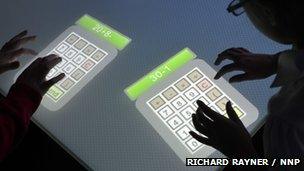'Online tests to replace paper exams within a decade'
- Published

Technology will permeate schools says a private schools' leader but will it bring pen-free exams?
Traditional exams will die out within a decade in favour of online assessment, predicts a private schools' leader.
Pen and paper exams will be a thing of the past by 2023, David Hanson of the Independent Association of Prep Schools will tell its annual conference.
"Technology will have been completely embraced" by a generation of teachers who grew up with it Mr Hanson will say.
Simon Lebus of the exam board OCR predicted "slow migration to e-assessment in high stake exams".
However he added that "the process will be evolutionary in that different subjects are likely to migrate at different times."
Pilot tests
Mr Hanson will say that in 2023, maths, English and science will remain core subjects but technology will permeate education.
Instead of written exams, assessment will be carried out in adaptive online tests where pupils sit exams on computers which analyse their ability and adjust the difficulty of the questions accordingly, he will say.
A similar system is being piloted by the Independent Schools Examination Board for the common entrance tests taken by prep school pupils aged 13 applying to senior school, Mr Hanson told BBC News.
Rod Bristow, president of Pearson which runs the Edexcel board, said that they were already delivering "nearly 900,000 onscreen tests in schools and colleges".
These are used to assess parts of their vocational BTec qualifications, for example.
Mr Hanson said greater use of online assessment would solve some of the logistical problems of paper exams such as the delivery and collection of papers.
He believes online assessment is potentially more secure and would help eliminate problems associated with mistakes made by individual markers.
Exam boards say they already use digital technology when marking A-levels and GCSEs.
Completed papers are scanned into a central computer and separate questions sent to specialist markers, rather than asking individual examiners to mark entire papers.
"This has made the assessment process quicker, more secure and most crucially, fairer for learners, with no single examiner marking an entire paper," said Mr Bristow.
In a statement the exam board AQA said that feedback from its own forays into on-screen exams had been "really positive with many teachers and students finding them a really good experience."
Technical hurdles
"Today's students are digital natives and everything else they do in their day-to-day lives is on-screen, so sitting an exam with pen and paper probably feels quite unnatural," a spokesman said.
However the boards warn of substantial technical and financial hurdles before online assessment can become universal - for example ensuring every school has hardware for every candidate and sufficient broadband.
"There is more to this than converting a question paper into an e-paper," said Mr Lebus.
"Will any change improve the assessment, give a more authentic picture of what the student knows and understands, not just make it faster?
"Would on-demand exams give the same level of fairness as the current system? Would e-assessment work against the less digitally competent?
"This is all without considering the technical questions around the interoperability of technology and broadband provision in 6,000 centres," he said.
- Published19 February 2013
- Published7 January 2013